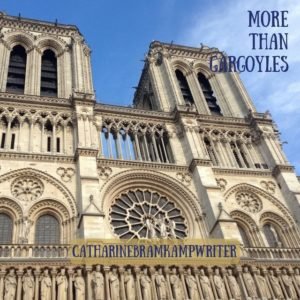Be More than The Gargoyle by Catharine Bramkamp
 Let’s welcome back monthly columnist Catharine Bramkamp as she shares with us “Be More than The Gargoyle!” Enjoy!
Let’s welcome back monthly columnist Catharine Bramkamp as she shares with us “Be More than The Gargoyle!” Enjoy!
***
“All bad poetry springs from genuine feeling. To be natural is to be obvious, and to be obvious is to be inartistic.” – Oscar Wilde
What if you wrote a beautiful poem and you feel strongly that this is the truth. It is the truth because it reflects exactly what you felt at the time. It is the truth because it welled up from the very depths of your soul.
What if there was just one tiny catch.
The beautiful poem is one enormous, looming, unattractive cliche. A gargoyle perched on the edge of the cathedral, it’s soul-less purpose to channel rain and stream it out as unfiltered liquid drenching unfortunate pedestrians below.
Most early writers don’t realize they’ve written a bad poem or a derivative novel. And that’s okay, as long as the artist in question is willing to fix their work and channel all that creative flow back into making the work stronger. But some aren’t. Some remain gargoyles.
I’ve recently encountered two writers who embody this particular kind of gargoyle – sensitive artist.
The teen who knows everything
I was employed to help two teens with their children’s story. I’m a developmental editor, I help many clients create published books. I wrote a few books myself. I have a couple of degrees in English.
That said, the two 17-year-old clients knew far more than I.
I was informed their story did not, in fact, require a story arc. Character development was not necessary nor was plot. Theirs was the perfect story and what they really wanted was for me to deliver a small trophy for a job well attempted. Thank you for participating.
The poet who knows even more than everything
I was volunteered to edit a poem for a writing club anthology.
I try my best with new authors/poets/teens/gargoyles to not squelch their art, but as you probably know, everything we write could use some helpful editing.
Not this poet.
The work was fine in concept, but the poem had been structured around the central theme of how people build walls around their hearts and those walls must come down in order for the aforementioned person listed in the first line of the poem, to find true love.
Since Sting already cornered this metaphor in Fortress Around Your Heart, I suggested we search for a central idea that was more original.
The poet, like my teenage storytellers, would have none of it. He did not want my suggestions or any intimation that his work wasn’t completely original and special.
Her walls keep out the bad guys.
It was a decided low point,
Gulf,
Gorge,
Abyss
In my poetic career.
“Her heart was a secret garden and the walls were very high.”
― William Goldman, The Princess Bride
Remembering that Princess Bride was a satire
Before I built a wall I’d ask to know
What I was walling in or walling out,
And to whom I was like to give offence.
– Robert Frost
Encircled you in trenches and barbed wire
And if I built this fortress around your heart
Then let me build a bridge
For I cannot fill the chasm
And let me set the battlements on fire
-Sting
When we start writing, it’s all new. Ah, this is love, this is hate, this is marvelous. We write it down, it’s new and perfect. But maybe we don’t realize our brilliant metaphor, our story, has been done before. Likely since Homer heard about it in an Athens cafe.
So where does that leave the artist, or rather, the emerging artist?
It is perfectly reasonable to be a new writer just figuring out your craft. I would argue that great writers are always figuring out, learning, and improving their craft. What was missing with my two emerging artists was the confidence that a person can be a great artist, yet still (always) benefit from feedback.
Also, there is no such thing as a completely original thought. Get over it. But there is such thing as your voice, your unique view of the world. Your choice of words. Just do a quick check to see exactly who went before you, be they bad, great or gargoyle.
You do not need to hire an editor to prevent the gargoyle stage. If you don’t have a background in literature (or film, or tropes), do a quick Google search and read how other writers treated your subject matter. Or ask a trusted reader to review your work. Do they “get” it? Were you compelled to explain the premise because it wasn’t immediately apparent? Did the metaphor you used help illuminate the theme or did it stop them cold? Did you write a poem or story in your own voice or did you accidentally work over a metaphor that was too obvious, awkward and convoluted, a gargoyle ruining the edifice of your magnificent church.
***
ABOUT THE AUTHOR
Catharine Bramkamp is the co-producer of Newbie Writers Podcast that focuses on newer writers and their concerns. She is a successful writing coach, Chief Storytelling Officer, and author of a dozen books including the Real Estate Diva Mysteries series, and The Future Girls series. She holds two degrees in English, and is an adjunct university professor. After fracturing her wrist, she has figured out there is very little she is able to do with one hand tied behind her back.







